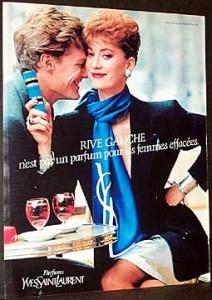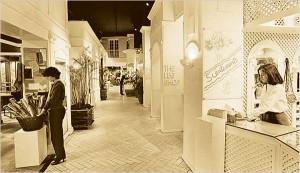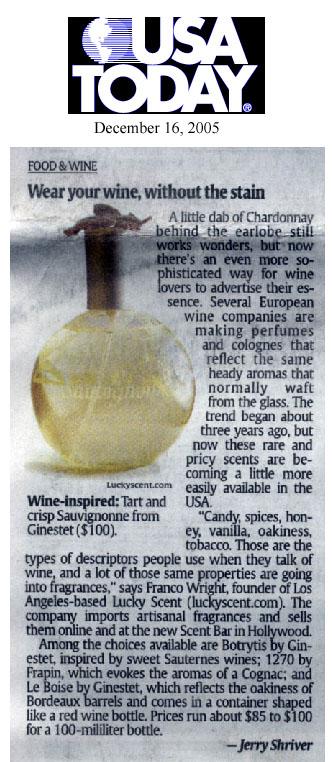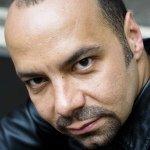
What are niche perfumes?
I came of age when twelve year old girls did not wear Prada. They did not even wear perfume, except, on special occasions when they borrowed a dab or two from their mothers’ beautiful bottles (I was in luck; my mother wore Molinard Habanita and my grandmother Rochas Femme by Edmond Roudnitska, which I wear to this day).
My first memory of trying to find a fragrance was one of frustration. I couldn’t find a scent that suited me. This was during the mid 1980s; the years of big, loud and powerful fragrances that did not suit young women. So I wore Rive Gauche as well as Rochas Femme until one day my ‘olfactive spirit’ was awakened.
I was shopping at Henri Bendel (at that time on West 57th Street in NYC, not at its present location) and wandered into the tiny boutiques. After buying “Russian Red”, a highly pigmented lipstick from a new Canadian company named ‘ M.A.C., I accidently ‘discovered’ a new genre of fragrance, which I knew intuitively was different- created by Artists. I didn’t detect what I called ‘that chemical smell” from these perfumes. That day I purchased my first two ‘niche’ fragrances: L’Artisan Parfumeur by Jean Laporte Pamplemousse and Annick Goutal L’Heure Exquise.
It is only during my year long experience as a publicist for www.Luckyscent.com, just before the explosion of the blogosphere, that I understood that I WAS THERE to experience a revolution; independent perfumers whose ideas promoted fragrances with artistic values as well as traditional ones. These creative concepts favored unusual notes and a high proportion of natural ingredients and is now known as ‘niche fragrances’.
The dictionary defines the word niche as:
|
1. |
an ornamental recess in a wall or the like, usually semicircular in plan and arched, as for a statue or other decorative object. |
|
2. |
a place or position suitable or appropriate for a person or thing: to find one’s niche in the business world. |
|
3. |
a distinct segment of a market. |
|
4. |
Ecology. the position or function of an organism in a community of plants and animals |
Obviously, we refer to definition 3, but in 2008, as the New in Niche Columnist for Base Notes, there were hundreds of new ‘niche’ launches that year. I could not keep pace. I will be blunt, by that time; most new ‘niche’ scents did not meet the criterion that I intuitively recognized that day in Henri Bendel. The width of niche was no longer a crevice but a huge pit, and the depth was questionable. I wrote, “But— Niche’s growth is so explosive there is danger here too. If a niche fragrance is not singular and different; if it tries to pass off expensive hard to find perfume as fine fragrance, it will become as ubiquitous and as boring as many of the commercial fragrances and lose its relevancy and cache.”
Over the past few years, I have posed the question— ‘what is niche?— to a number of renowned perfumers and advocates; I will turn its ‘history’ and its future over to them and those yet to ‘bloom’.
Verse One: In the Beginning
(Antonia Bellanca, Founder and Owner of Antonia’s Flowers)
“ I would love to know myself when and where the term niche first appeared- I honestly think all those wonderful small French houses were the first- what was the one on the left bank around the corner from the St. Simon –all those small company’s with longish poetic lines-Penhaligon from England together with those French lines were always sought out by discerning noses …the big breakthrough would have been Annick Goutal capitalizing on those small French lines that came before her by invoking them and then launching here in the US, which encouraged other small euro houses to think differently and larger; here maybe Perfumer’s Workshop Tea Rose and then me from my Flower Shop in East Hampton-loads followed usually imagining they would begin as I had and then grow to dept store lines-which I always thought was kind of funny and odd. My object has always been to be small and select. My goal was to start and end niche and most of all to be committed to whatever fragrances I brought to market so that they would be available beyond whims and trends and swim with the classic; fragrances can be created to express a particular time and mood BUT they have to be able to sustain by some kind of independent ageless spirit. My company is 29 years old. I now have three generations wearing my original scent Antonia’s Flowers. It is what I set out to accomplish”
(Ron Robinson of Founder of Ron Robinson, Inc. and APOTHIA Fragrances)
“In the 80’s I opened APOTHIA (creating the name from Apothecary + Utopia) as an addition to my already thriving fashion apparel business. Having always been attracted to the graphics and packaging of the beauty industry and knowing there was not a specialty offering available, it was a perfect complement to our business. At that time, that our customers could purchase fragrance, personal care products and beauty items was from a department store, a beauty supply store or a drug store. The idea of having a selected and edited boutique approach was nonexistent, yet our customers thrived on that type of merchandise offering. I saw so many special and unique items while traveling for fashion in Europe and Japan that it was a no brainer to bring these exclusive items in. Our display was unique, not packed and stacked, but beautifully displayed and lit. It was clear that once we began to curate and present specialty items more specialty makers also found us- and the customers responded! Over the years we have been the first to support so many lines, from Czech and Speake, Hard Candy, Kiehls, Child, Lorac, Gendarme, Geir, Sarah Horowitz-Thran and literally dozens more. We are fortunate to continue today with brands that are true specialty start ups.
(Liz Zorn, Soivohle Perfumes)
“There is a line drawn in some circles between niche’ and indie. We consider ourselves more indie than niche’ since niche’ doesn’t always mean small or independent, but rather branches connected to big corporate trees. Indie is often defined by quality, and most if not all natural perfumers could be considered indie, since they work outside the mainstream. Or perhaps the term micro niche’ would apply. I was making perfumes long before I had an online presence, and although the internet is great for ready to wear, custom and bespoke scents are still locally and regionally fueled. I am sure there are many indie bespoke perfumers that we all known nothing about”.
(Maria McElroy, aroma m)
“A cult fragrance, that is what I remember aroma M being referred to, not niche, as we launched at Bergdorf Goodman, back in the 90’s. There were just a handful of us and it was a thrilling to be in the Bergdorf catalogue and sell out of our original Geisha o-cha perfume. The buzz was different, no blogs or websites. Kerry Diamond was a champion for many and I still love to read the article she wrote in WWD on me and aroma M “Asian Major”.
In the 1990’s oil perfumes were scarce and natural ones in fine fragrances even more so. I remember finding the classic Chanel square French bottle to launch my oil perfumes in and a few years later in a roll on it was novel. There was an excitement at the time because we were creating a new perfume category. My full page picture and article in the 2002 O Magazine along side Joe Malone, Beth Terry and Susan Kenward let everyone know that we had arrived. Aroma M is now in its fourteenth year and with the re launch of Geisha O-Cha in an oil perfume, aroma M is still on the edge of an ever changing, now referred to as “Niche” perfume industry.”
Verse Two- Après le déluge
(Ralf Schwieger, Perfumer)
“I am not opposed to the term ‘niche’. As many others working in this field I believe that it appropriately refers to the size of this alternate market although even there you can observe an explosive multiplication of scents. I have not smelled all these fragrances closely enough to judge but I am not often impressed; I guess if you do not have to respond to marketing criteria and consumer testing you would try to conjure a miniature work of art… and be more daring. I appreciate that niche perfumery goes away from celebrity and fashion designer scents and back to the roots when perfumers had the say”
(Ulrich Lang, Founder and Owner Ulrich Lang New York)
“I would certainly say that there has been a lot “jumping on the bandwagon” recently and quite a few lines have been “invented” by looking at what other entrepreneurial brands are doing / have done successfully in the past 5 years. It would be good to look at a time line of niche brands and I would possibly say that 2006 marked a year when we saw more “niche” lines than ever before, it became more diluted and more “mainstream”, accelerated by the internet, media and new developments in retail.
What are niche perfumes? I like your definition of niche nicher and nichest. Nichest comes closest to Susanne Stoll’s (editor-in-chief of Germany’s Inside Beauty Magazine) term “future brands” – this whole field is so new, we still don’t know where it’s going. Look at the market 7 years ago; I had a mere six accounts worldwide. I think it’s fantastic that there has been so much recognition by the consumer. No wonder everybody wants a piece of the cake.
(Gerald Ghislain, Perfumer and Owner of Histoires de Parfums)
“Yes, the niche parfumerie makes sense today, especially during this recession time, because niche perfumes are products with a purpose, with a story. It was my vision for Histoires de Parfums. My perfumes are skin tells, smell instead of words, to read up to your mood: inspired by time, character, smell….When we wear a niche perfume we are wearing a story.
For example Chanel No. 5 could be a niche perfume because of the story behind it, contrary to so many other perfumes that are mostly a marketing story.
Niche perfumes allow transgression, breaking rules and codes, creating sense, the perpetual search for the beautiful, offering the wearer stories.”
Coco Chanel said: “no elegance without perfume. This is the invisible, ultimate, unforgivable accessory”, that makes sense with the niche perfumerie.”
(DelRae Roth, Founder and Owner of Parfums DelRae)
“The niche market has really exploded, as the industry is really looking to niche to see where to go. It’s where the real risks are taken. To me, a niche brand represents genuine quality and exclusivity. And, perhaps most importantly, these brands have a vision, a real point of view. Because of this focus, these brands tend to be smaller and have a creative visionary directing development. My experience suggests that if you are trying to satisfy everyone, it is not possible to be innovative and qualitative.”
(Bertrand Duchaufour, Perfumer)
“Here there isn’t a hard line, a tangible border between commercial fragrances and niche products. That means you can find the more horrible copy in a so-called niche brand and a very original innovative accord in a very commercial launch. Very difficult to point precisely as to the exact character of a new launched fragrance because, it is increasingly rare to distinguish between them.
I am sure of one thing: time is the best judge of a fragrance. If Perfumery is to remain an Art, it will be those fragrances that compel us based on quality and originality, not necessarily label or price.”
(Rodrigo Flores-Roux, Perfumer)
“The word “niche” is another word that has been misused and overused a lot. Originally, the word “niche” applied to fragrances that were sold in very few, and very selective points of retail. These retailers catered to an exclusive clientele; (sometimes with rather discerning tastes) they could boast unique personalities, uncanny strengths, incredibly high quality of materials or quirky olfactive profiles… This conceptual positioning has now evolved, overblown, into a new meaning; something that doesn’t smell commercial or easy is considered niche…”
(Mark Buxton,Perfumer and Founder of Mark Buxton Perfumes)
Ah everyone uses this term now; it is not ‘fresh’ anymore. Every year, for five or six years, there have been too many new launches calling themselves “niche’. But I am hopeful, as there are still some good new perfumes to be found ‘en niche’.
Editors Note: Compilation of quotes from various interviews I have done over the years.
-Michelyn Camen, Editor-in- Chief















